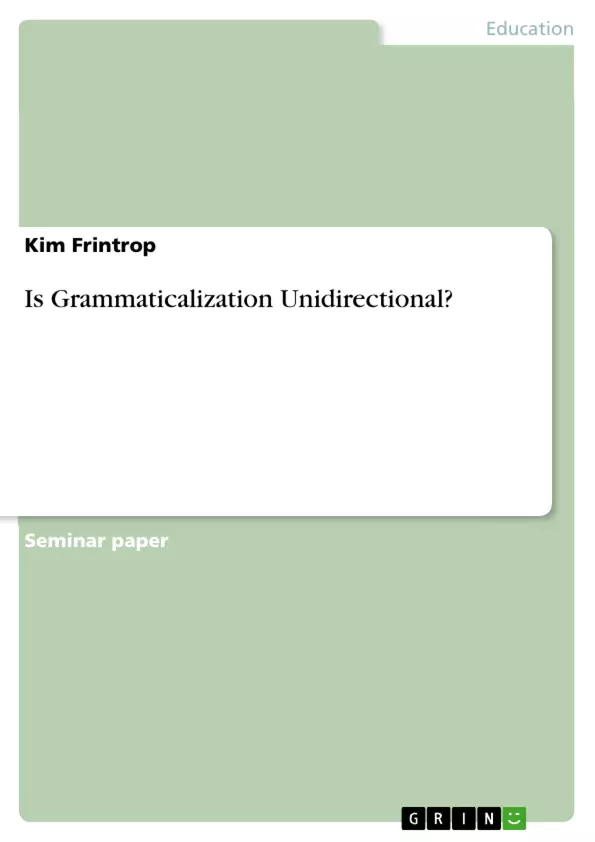Grammaticalization is a well-attested process of language change and presents a complex sub-field of linguistics. Although grammaticalization is believed to be a rather young area of linguistics, its history is as old as the history of linguistics (cf. Narrog & Heine 2011: 1). The term ‘grammaticalization’ itself was apparently first coined by the French linguist Meillet, a pioneer in the field of grammaticalization. In his work L’évolution des formes grammaticales (1912), Meillet describes the process of grammaticalization as “Le passage d’un mot autonome au rôle d’élément grammatical” (1912: 131 cited in Ferraresi 2014: 1) indicating a change of an erstwhile autonomous sign into a grammatical element. A more recent definition of grammaticalization is given by Hopper and Traugott who define it as “the process whereby lexical items and constructions come in certain linguistic contexts to serve grammatical functions, and, once grammaticalized, continue to develop new grammatical functions” (2008: xv).
Although the field of grammaticalization is already widely explored, its studies remain interesting since several of them have been the subject of critical discussions. One of the most interesting and challenging hypotheses in grammaticalization studies is presented by the unidirectionality hypothesis: “the claim that changes that fall into the category of grammaticalization always move into the direction – from more to less lexical or from less grammatical to more grammatical” (Börjars & Vincent 2011: 163).
However, is it not possible for a grammatical item to become less grammatical or even lexical? On the basis of Norde’s recent study on degrammaticalization (2009; 2012), the paper will take a closer look whether the unidirectionality hypothesis is entirely true or not.
The following paper is structured as follows: section two provides a brief overview of central concepts and definitions involved in grammaticalization and finally it presents Lehmann’s parameters of grammaticalization (1995). In section three, the paper features a central approach on how the unidirectionality hypothesis can be explained. Section four presents two valid counterexamples of the unidirectionality hypothesis with respect to Lehmann’s parameters (1995). To conclude, the paper summarizes the main results.
Inhaltsverzeichnis (Table of Contents)
- Introduction
- Basic concepts and definitions in grammaticalization studies
- Basic definitions and conceptual mechanisms
- Lehmann's parameters of grammaticalization
- Defining degrammaticalization
- Explaining the hypothesis of unidirectionality
- Case studies
- Pennsylvania German wotte: from modal auxiliary to lexical verb
- The English s-genitive: from inflectional genitive suffix to a clitic
- Conclusion
Zielsetzung und Themenschwerpunkte (Objectives and Key Themes)
This paper investigates the validity of the unidirectionality hypothesis in grammaticalization studies, using Lehmann's parameters of grammaticalization (1995) and Norde's work on degrammaticalization (2009; 2012) as theoretical frameworks.
- The process of grammaticalization and its conceptual mechanisms
- Lehmann's parameters of grammaticalization
- The unidirectionality hypothesis in grammaticalization studies
- The concept of degrammaticalization
- Case studies exploring potential counterexamples to the unidirectionality hypothesis
Zusammenfassung der Kapitel (Chapter Summaries)
The paper begins by introducing the concept of grammaticalization and its historical significance in linguistic studies. It then delves into key definitions and mechanisms involved in this process, specifically focusing on the distinction between lexical and functional items. Lehmann's parameters of grammaticalization are also presented, offering a framework for analyzing grammaticalization across languages. The paper further explores the unidirectionality hypothesis, examining the claim that grammaticalization progresses from more lexical to more grammatical, and introduces the opposing concept of degrammaticalization. To challenge the unidirectionality hypothesis, the paper presents two case studies: the development of the Pennsylvania German modal auxiliary "wotte" into a lexical verb and the evolution of the English s-genitive from an inflectional suffix to a clitic. These case studies demonstrate how grammatical items can potentially become less grammatical or even lexical, posing a challenge to the traditional unidirectional view of grammaticalization.
Schlüsselwörter (Keywords)
This paper centers around the key themes of grammaticalization, degrammaticalization, unidirectionality hypothesis, lexical items, functional items, Lehmann's parameters, case studies, English s-genitive, Pennsylvania German "wotte", language change, and linguistic history. The paper aims to contribute to ongoing discussions about the dynamic nature of language and the complexities of grammaticalization processes.
Frequently Asked Questions
What is grammaticalization in linguistics?
Grammaticalization is the process by which lexical items and constructions evolve to serve grammatical functions, often becoming more abstract and less autonomous over time.
What does the unidirectionality hypothesis state?
It is the claim that language change in grammaticalization always moves in one direction: from more lexical to less lexical, or from less grammatical to more grammatical.
What are Lehmann’s parameters of grammaticalization?
Christian Lehmann proposed a set of parameters (such as integrity, scope, and bondedness) to measure the degree of grammaticalization of a linguistic sign.
What is degrammaticalization?
Degrammaticalization is a counter-process where a grammatical item becomes less grammatical or even develops lexical meaning, challenging the unidirectionality hypothesis.
Can you give an example of a challenge to unidirectionality?
The development of the Pennsylvania German "wotte" from a modal auxiliary back into a lexical verb and the English s-genitive's shift from a suffix to a clitic are cited as examples of degrammaticalization.
- Citation du texte
- Kim Frintrop (Auteur), 2014, Is Grammaticalization Unidirectional?, Munich, GRIN Verlag, https://www.grin.com/document/281042



